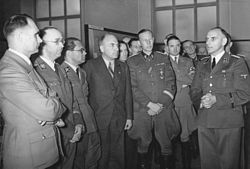Konrad Meyer
Konrad Meyer-Hetling | |
|---|---|
 Meyer-Hetling in U.S. custody | |
| Born | 15 May 1901 |
| Died | 25 April 1973 (aged 71) |
| Political party | Nazi Party |
| Criminal status | Deceased |
| Motive | Nazism |
| Conviction(s) | Membership in a criminal organization |
| Trial | RuSHA trial |
| Criminal penalty | Time served |
| SS career | |
| Allegiance | |
| Service | |
Konrad Meyer-Hetling (15 May 1901 – 25 April 1973) was a German agronomist and SS-Oberführer. He is best known for his involvement in the development of Generalplan Ost.
Early life
[edit]Meyer was born in Salzderhelden, near Einbeck, in southern Lower Saxony, the son of a school teacher.[1] He studied agronomy at the University of Göttingen and received his doctorate in 1926 with a thesis on crop production.[1] He became an assistant at the university and did his habilitation in 1930.[1]
From 1930 to 1933, Meyer worked as a docent at the University of Göttingen, and in 1934, he became a full professor at the University of Jena.[1] The same year, he became a professor at the University of Berlin.[1] In November 1934 he became a consultant for the Reich Ministry of Science and Education on the reformation of German agricultural education and research.[1] Meyer was one of the key agricultural scientists and spatial planners of the Nazi era, and served as the chief editor of the main journals of the field.[2]
Generalplan Ost
[edit]
Meyer joined the NSDAP on 1 February 1932 (member number 908,471),[1] and the SS on 20 June 1933 (member number 74,695).[2] In 1935, he was recruited to the SS Race and Settlement Main Office (RuSHA).[2] In 1939, he became the head of the Planning Office under Himmler's office of Reich Commissioner for the Consolidation of German Nationhood (RKF), and he also worked for Himmler's personal staff.[2]
In early 1940, the Reich Security Main Office (RSHA) produced, with Meyer's collaboration, the initial version of Generalplan Ost (General Plan East), a plan for the Germanization of Eastern Europe.[1] Meyer's subordinates in RKF's creating the memorandum included geographer Walter Christaller and landscape architect Heinrich Friedrich Wiepking-Jürgensmann. From 1944 to 1945, the end of the war, Meyer served an officer in a Waffen-SS officer training school.[2]
Later life
[edit]After the war, Meyer was charged by the US authorities in the RuSHA Trial. He was found guilty of being a member of a criminal organization (SS) but not guilty of war crimes or crimes against humanity.[1] He was released in 1948, and in 1956, he was appointed professor of agriculture and regional planning at Leibniz University Hannover, where he worked until his retirement, in 1968.[1]
References
[edit]- ^ a b c d e f g h i j The Nuremberg Medical Trial 1946/47 - Guide to the Microfiche Edition: With an Introduction to the Trial's History by Angelika Ebbinghaus and Short Biographies of the Participants, 2001, Walter de Gruyter, ISBN 3110950073, p. 119
- ^ a b c d e "DFG (German Research Foundation) - Konrad Meyer, Umsiedlungsplaner der SS". Archived from the original on August 20, 2007. Retrieved January 2, 2013.
{{cite web}}: CS1 maint: unfit URL (link)
External links
[edit] Media related to Konrad Meyer (agronomist) at Wikimedia Commons
Media related to Konrad Meyer (agronomist) at Wikimedia Commons
